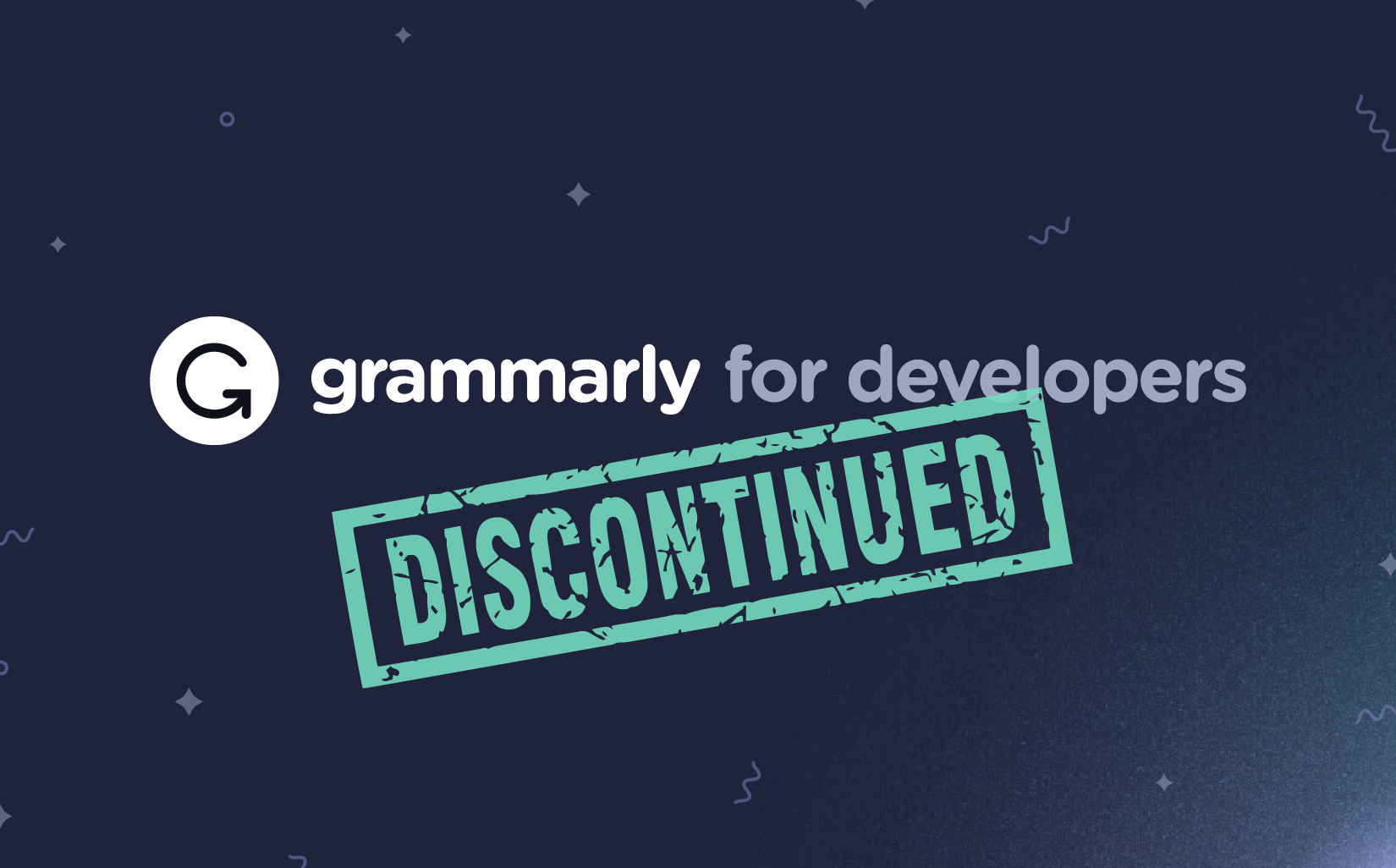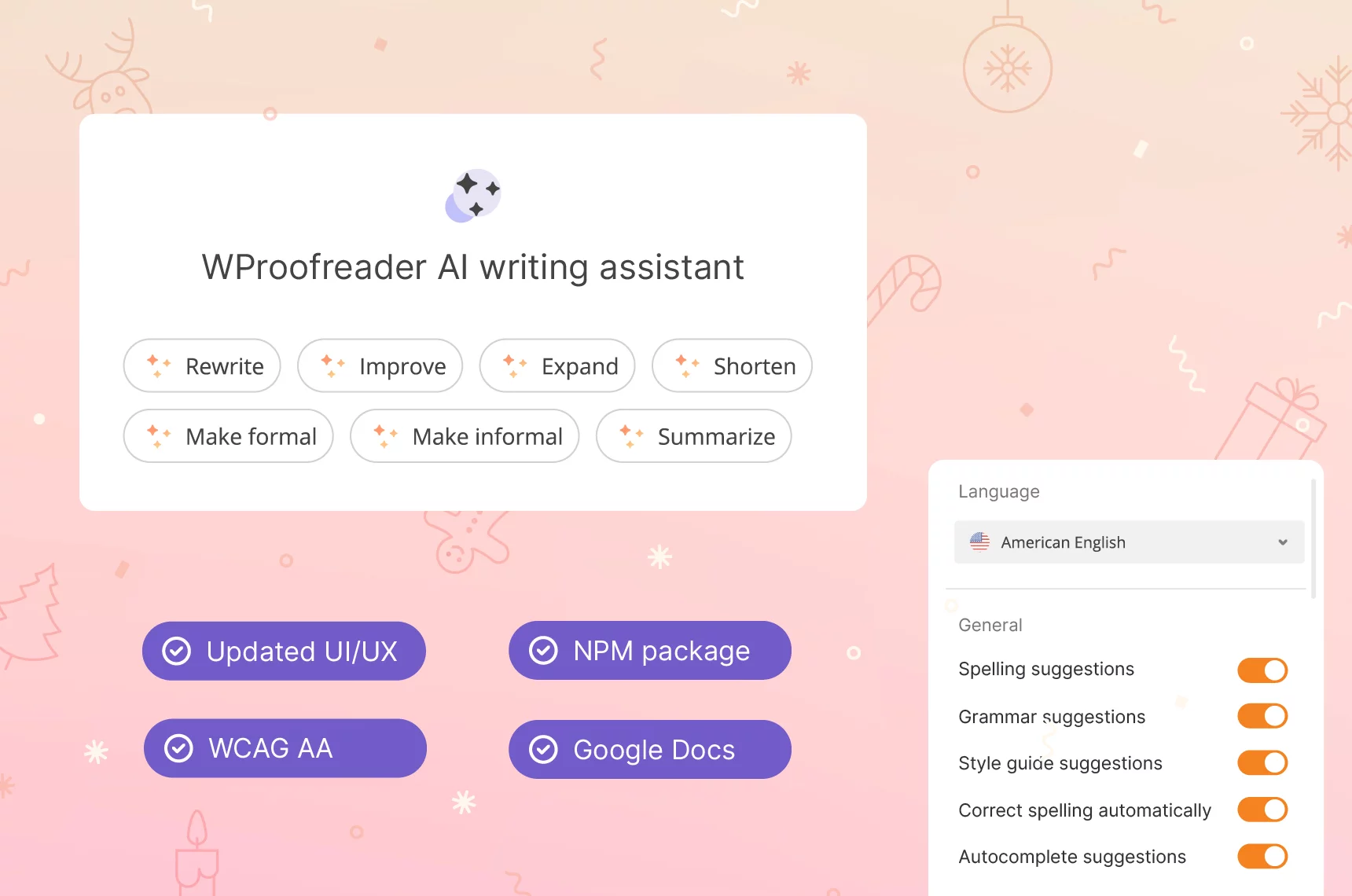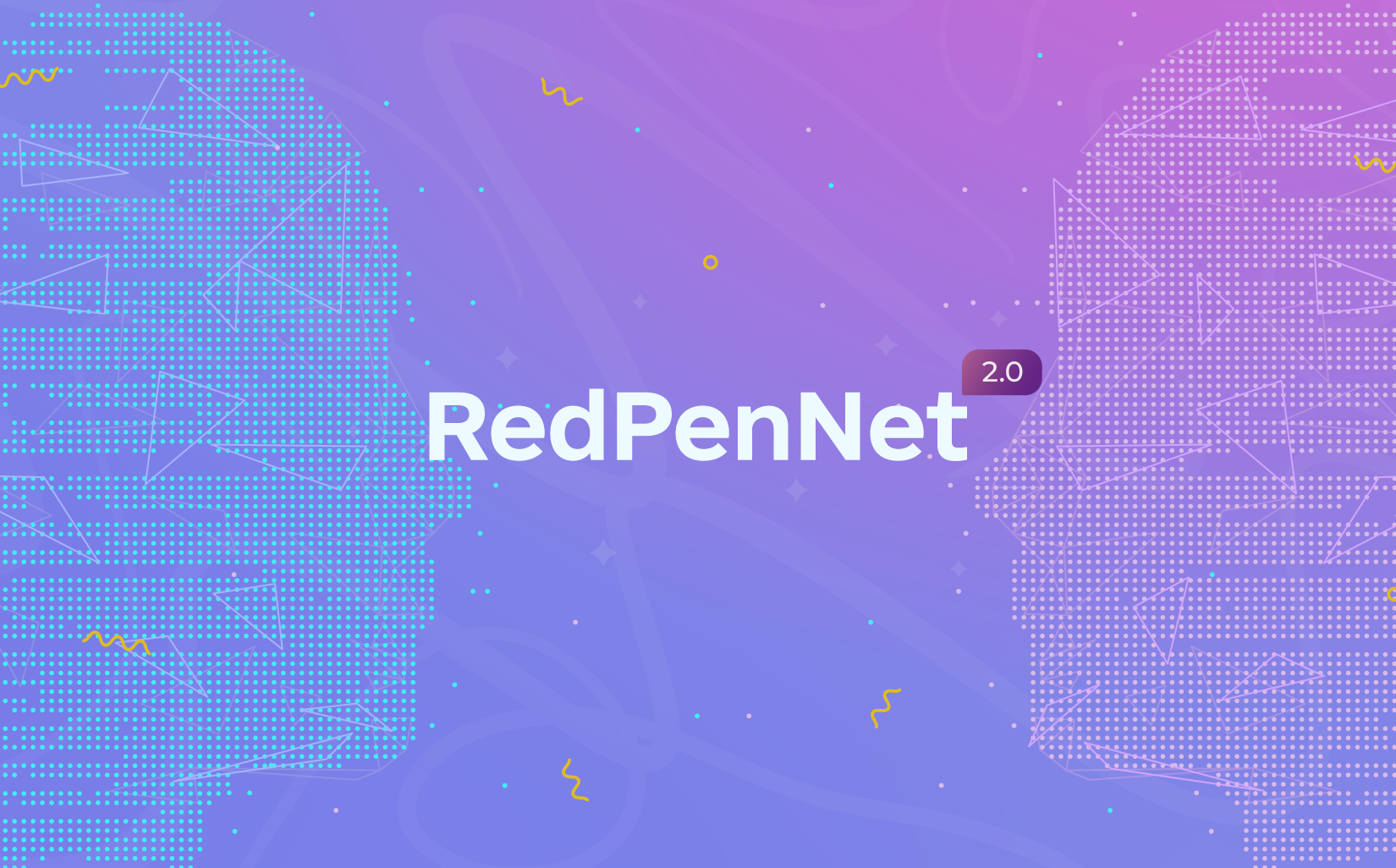Three years ago, Grammarly stirred up the market of digital proofreading solutions by announcing its Software Development Kit (SDK) release. That was like a bolt from the blue: Grammarly that was long focused on individual users and companies, decided to make a shift and enter the solutions for the developers sector? Unexpected. Furthermore, other players like ProWritingAid, Ginger software, Sapling AI announced alternative SDKs in the hope of enticing Grammarly’s potential customers. And that was expected 🙂
For two years, we’ve been carefully observing the market conditions, trends and changes. Serving this niche for more than 20 years and understanding all the nuts and bolts, we were not surprised when Grammarly announced the deprecation of their solution two years after its release.
The result of this is thousands of companies seeking an alternative solution to Grammarly for developers. If you’re one of them, this article is gonna help you.
WProofreader SDK for developers
Available as a cloud or on-premise solution. Get free trial.
Explore moreHow to choose a robust and reasonable alternative to Grammarly SDK
First things first. Let’s start with the Grammarly SDK deprecation case.
In its official announcement, Grammarly stated that the reason for deprecating the Grammarly SDK is to prioritize the development of their core product offering and improve various aspects of organizational communication workflows. This decision was made based on feedback and insights gathered from the developer community. The goal is to expand their product beyond writing assistance and create an AI-connected workplace — Generative AI everywhere 😁
Grammarly’s upcoming initiative, the AI-Connected Workplace, is set to introduce several new features that will be live this year. This workplace will be built upon Grammarly Go, which will have access to various third-party tools like Google Drive, enabling it to pull information seamlessly. The domain for this initiative is “enterprise”. Additionally, Grammarly emphasizes that these new generative solutions will be highly secure compared to other “experimental technologies”. Mainly because GrammarlyGo is based on Azure OpenAI which provides robust security capabilities and data privacy standards.
Since the launch of the SDK, thousands of developers have evaluated it, and hundreds have built applications using it. As a result of its deprecation, developers will need to adjust their programs, since the SDK capability will only be available to customers who purchase the service.
[Updated] Grammarly for Developers and the Text Editor SDK were discontinued on January 10, 2024, and will no longer work in apps.
Therefore, it’s important for many developers to find the closest alternative solution and smoothly migrate to it.
Recently we started receiving requests from clients who want to migrate from Grammarly SDK with more or less similar requirements related to: SDK integration, SDK/API usage, customization and adaption options, security measures for cloud-based product versions and on-premise solution (certification SOC 2, ISO/IEC 27001, etc), data migration procedure, product strategy, policy and capabilities related to Data Privacy, GDPR, an average implementation timeline, pricing policy.
Earlier, we made a comparison analysis between various Grammar checker API providers with a focus on their tech capabilities. This time we’d like to switch our attention to other essentials: proofreading capabilities, SDK/API options, deployment, security measures for cloud service, on-premise deployment options, pricing policy.
For comparison, we selected several vendors: Writer.com, LanguageTool, Sapling, and ProWritingAid. We also contacted PerfectTense, Ginger and Outwrite with a request for additional details regarding their offer, but we never got a reply.
You can find all the information we had a chance to find on the official websites of vendors in the comparison table below. Please note this information is relevant as of June 2024 and it may change with the lapse of time. Should you doubt any of the facts provided, please contact the vendor directly.
| Feature | WProofreader SDK | Writer.com | LanguageTool | Sapling | ProWritingAid |
| Product | WProofreader SDK | Writer.com API | Proofreading API | Sapling API and SDK | Text and grammar checking API |
| Proofreading capabilities | Spelling, grammar, punctuation, and style check, autocorrect & autocomplete, style guide, dictionaries, non-inclusive language check, paraphrasing tool powered by generative AI | Generative AI | Spelling, grammar, punctuation, and style check, paraphrasing, team dictionary | Spelling, grammar, punctuation, and style check, autocomplete, paraphrasing, summarizing, AI Detector | grammar, style, and terminology |
| SDK/API | JavaScript SDK | Java, PHP, Python, Typescript, Go | JSON API, Java, Python, Rust | JavaScript SDK, Python | C#, JavaScript, Typescript, PHP, Python, Java |
| Deployment | Cloud and on-premise | Cloud and on-premise | Cloud and on-premise | Cloud and on-premise | Cloud only |
| Security measures for SaaS solution | Infrastructure is run on AWS with data centers in the US East region. Client data in transit is protected using HTTPS with the TLS 1.3 protocol. Data at rest is encrypted using AES-256 server-side encryption. Constant vulnerability scanning, security testing with major updates. | Fully cloud-based service hosted on Google Cloud Platform (GCP). TLS 1.2 for data in transit. Data stored is encrypted at-rest by GCP with AES 256-bit secret keys. | All servers are hosted in Germany, and the service is fully GDPR-compliant. | Annual external VAPT, GDPR compliant, SOC-2 certified. | TLS1.2 encryption, SOC-2 compliant. |
| On-prem options | Yes | Through GitHub, Amazon SageMaker or Single- vs. multi-tenant SaaS | Yes | Yes | No, the language models require the allocation of lots of hardware resources. |
| Pricing policy | Tailored pricing based on software integration: number of products, product redistribution, languages, support needs, any special functionality or integration prerequisites. Contact us | custom workflows ~$75,000 – $250,000 annually. | The pricing is based on requests: from $39 for 100 API calls to custom pricing for 1000+ API calls. The one-premise version is only available for plans with 25,000 requests/day or more as a yearly subscription with an upfront payment. | The cost is based on the number of input characters for the API: from $0.025 for 0MM-10MM chars to custom pricing for requests over 100MM chars. | Talk to sales |
If you don’t have time for wading through the table, don’t worry, we’ve prepared a detailed comparison of solutions in the next block.
WProofreader SDK vs alternative solutions
As for deployment, all vendors except for ProWritingAid grant flexibility in deployment, accommodating cloud-based and on-premise installation. In contrast, ProWritingAid exclusively operates within only a cloud-based framework offered as a SaaS solution.
WProofreader SDK secures its cloud infrastructure via AWS hosting, implementing TLS 1.3 encryption for data in transit and fortifying data at rest with AES-256 server-side encryption. Writer.com prioritizes security by selecting Google Cloud Platform (GCP) as its host, LanguageTool ensures data privacy by hosting servers in Germany, maintaining strict GDPR compliance. Sapling AI and ProWritingAid place a strong emphasis on security adhering to SOC 2 Type II certification.
While some digital proofreading solutions transparently present their pricing structures, others encourage direct vendor contact for tailored pricing information. Writer.com charges $75,000 — $250,000 annually for custom workflows. LanguageTool pricing hinges on the number of API call requests, ensuring scalability; Sapling AI calculates the price based on the number of characters processed.
Here are a few more details about WProofreader SDK that may help you during the migration process.
WProofreader SDK is a combo of pre-built components for WYSIWYG editors such as CKEditor, Froala, TinyMCE, Quill.js, and a standalone HTTP API helping development teams enrich web apps and custom systems with grammar and spelling check functionality.
WProofreader SDK pricing:
Cloud
WebSpellChecker cloud services are tailored based on the number of words processed annually. The cost varies depending on this metric and covers various check types: spelling/grammar, basic style, punctuation, spelling autocorrect, and autocomplete suggestions for English.
It’s worth noting that the significant usage or purchasing of volumes might qualify users for volume discounts or tailored pricing.
On-premise
For the WProofreader SDK on-premise version, the pricing is more bespoke, hinging on specific requirements and technical details. Crucially, there’s no cap on the number of end-users or the volume of text processed. We craft individual offers for on-premise clients based on parameters such as: number of products for integration, whether the proofreading solution will be redistributed with the client’s product, required languages, application support needs, any special functionality or integration prerequisites.
Core features:
- Fluently multilingual. It checks grammar and spelling in English, German, Spanish, French and more languages. AI-driven English, German and Spanish are available. Automated language detection.
- Advanced proofreading options: spelling autocorrect, autocomplete suggestions, style guide with grammar rules for non-inclusive language check for English
- Accessibility compliance with WCAG 2.1 and Section 508 standards and customization options
- Integration options with popular rich text editors (RTEs) such as CKEditor, Froala, TinyMCE and HTML editable elements and standalone API
- Global company and user custom spelling dictionaries
- Flexible deployment options for the on-premise version: on-site and in a shared cloud
- WProofreader AI writing assistant 🪄: Efficient paraphrasing and content creation with generative AI. Correct your writing style, length, or completely rewrite it with preset prompts. You can use it for English, German, Spanish, Portuguese, French, Dutch and Swedish.
How to migrate from Grammarly SDK to WProofreader SDK
If you’re already ready to migrate from Grammarly SDK or an alternative solution to WProofreader SDK, here are a few essentials to take into consideration.
When transitioning to our WProofreader spelling & grammar check service, there are important components to ensure a smooth integration:
- Specialized dictionaries: if your company maintains word sets or specialized dictionaries tailored to your specific needs, they can be seamlessly integrated into WProofreader. These word lists can be migrated as plain text (.txt) files.
- Company style rules: for organizations with pre-established style guides, we facilitate their integration into our proofreading service. If you’ve set up style guide rules in tools like Grammarly, they can be exported in CSV format or as spreadsheets, and our team will integrate them into your WProofreader subscription.
Since you’re migrating from Grammarly SDK, the same data types, including specialized dictionaries and style rules, might be migrated if present to our WProofreader SDK. If there are other specific data elements from your SDK solution which you’d like to transfer, you’d better let us know so we can facilitate the process accordingly.
Here are a few guides to help you get started with WProofreader Cloud and On-premise solutions.
On a side note
So, having summarized everything above, we come to the conclusion:
- there are many alternatives to Grammarly for developers over there. While some mainly focus on quality proofreading capabilities, e.g. WProofreader SDK, others go towards the generative AI realm — Writer.com and Sapling AI. Their solutions are a way pricier, yet they offer advanced options for enterprises like AI-connected work spaces.
- when selecting a vendor, take into consideration these essentials: proofreading capabilities, SDK/API options, deployment, security measures for cloud service, on-premise deployment requirements, pricing policy, etc. A good idea is to create a vendor compliance questionnaire for security-related inquiries.
- the pricing for grammar check API providers varies by the deployment type, capabilities offered, API calls/characters/users count. WProofreader is a value for money tool; even for on-premise solutions, with custom configuration, we charge reasonable money.
- most providers offer both cloud and on-premise licensing options. Cloud versions follow all modern security practices: data in transit and at rest encryption, security certificates, GDPR compliance, SOC 2 and ISO/IEC 27001 report compliance. Some vendors like ProWritingAid do not offer on-premise deployment options since their language models are too large.
- Migrating from Grammarly SDK to WProofreader SDK can be smooth and gradual. We offer detailed guides and support help in case any difficulties occur.
Just give us a buzz.










